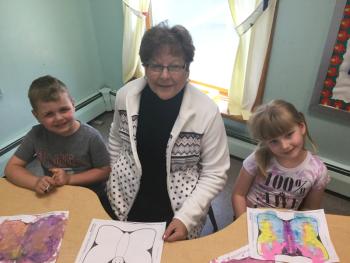By TARA CONNOLLY Staff writer
At age 6 Grace Smith learned she would have to fight Type 1 Diabetes for the rest of her life.
For most of her life, she lived without any health complications, played sports, got married and even gave birth to a son, Patrick Smith, a teacher at Marian High School, Tamaqua.
Smith, now 60 and head of the preschool program and director of religious education at All Saints, McAdoo, successfully delivered her premature son via caesarean section and even battled and beat breast cancer in 1993, before complications from diabetes began to creep into her life.
In 2014 Smith experienced cardiac complications and kidney failure, leading doctors to place heart stents in her with the hopes of strengthening her arteries.
“My kidneys kind of rebounded, but the dye they used for the stent procedure was toxic to my kidneys,” said Smith.
Eventually it became harder for doctors to control her blood pressure – a complication from diabetes – and she was prescribed the maximum dose of blood pressure medication.
Then Smith’s kidneys began to function under 20 percent, allowing her to be placed on the national waitlist for a kidney transplant at Johns Hopkins Comprehensive Transplant Center, Baltimore, Maryland.
“The waitlist for a kidney is normally four or five years,” said Smith.
“But since my blood type is O, I can only receive a kidney from another person with type O. In my case, it will take a couple of years longer because most blood types can receive from different blood types,” she said.
Although her son is an ideal candidate as a living donor, Smith said he cannot be considered because he was born with only one kidney.
“The best transplants are from living donors. There are certain requirements, testing and a lot of restrictions – so that makes it hard for people to qualify and to find the time,” she said.
“My family, friends and co-workers have been very supportive. Many of my family and friends have offered rides to appointments or anything that I might need. Some have offered to be donors, but for one reason or another do not qualify.”
In addition, as part of being on the national registry, Smith must be within three hours of traveling time to receive a kidney if one becomes available.
The family is seeking persons interested in being tested as a direct donor for Smith – even if they don’t share the same blood type or ultimately are not a match.
Prospective donors’ time and testing would not be in vain because of the paired kidney exchange the transplant center participates in.
The paired kidney exchange, or “kidney swap,” is when a living kidney donor is incompatible with the recipient, so exchanges his/her compatible kidneys with another donor/recipient pair.
“That means two live donor transplants would happen,” said Smith.
Persons interested in becoming a potential donor for Smith or other persons in need of a kidney can visit the Living Donors page on Johns Hopkins Comprehensive Transplant Center website by clicking here.
Information is also available at Lehigh Valley Transplant Center, 610-402-8506, option 5.








